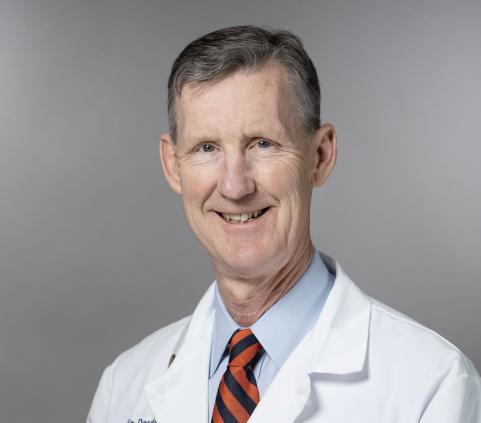Meet Colin Derdeyn, Chair of the Department of Radiology & Medical Imaging

Colin Derdeyn, MD, is Chair of the UVA Department of Radiology & Medical Imaging and a national leader in ischemic stroke research. Dr. Derdeyn shared with us about his background and research.
Brain Institute: Briefly describe your current research projects and interests.
Dr. Derdeyn: My biggest current project is helping to lead a large NIH-funded multicenter platform trial for endovascular stroke treatment. This platform will allow testing of multiple interventions, adjuncts to intervention, and treatment strategies in a novel and efficient way. Within that space, I have particular interests in uric acid as a neuroprotectant agent and for rescue stenting for patients with underlying intracranial atherosclerotic disease. Outside of the platform, I have collaborations with investigators working on trials of revascularizaton procedures for patients with chronic atherosclerotic occlusive cerebrovascular disease – carotid stenosis and occlusion. Finally, I am working on a study looking at neuroprotective strategies for patients after aneurysmal subarachnoid hemorrhage.
How does your research connect with the field of neuroscience?
My work all falls under the banner of ischemic stroke – the damage to the brain caused by insufficient blood flow. My projects all relate to improving the outcomes of patients after an acute arterial occlusion and ischemic stroke, and also stroke prevention - reducing the risk for ischemic stroke.
What aspect of neuroscience research at UVA is most exciting to you?
All of it! I’m grateful to be a part of such a vibrant community.
What's the best part about your job?
Being a part of great teams.
What led you to a career in science and neuroscience?
I was drawn to medicine first – my father was a doctor - the head of Child and Family Psychiatry here. I did some neuroscience research as an undergraduate here – a seminar on circadian rhythms and I worked in Ozzie Steward's lab and I found that fascinating. And then within medicine I loved psychiatry, neurology and neurosurgery, and ultimately found neuroradiology after starting a residency in neurosurgery.
What advice do you have for trainees?
For clinical trainees looking for a specialty– medical students and residents – to try everything on for size and keep an open mind for what field they want to pursue. For finding a research niche – find a really good mentor with a happy, productive lab.
What's something new that you've learned recently (at work or outside of work)?
I saw some really interesting work on taking data from fMRI and the relative strengths of different networks, like the default mode, in patients with depression and using these to guide intervention. Patients with depression have great variability in the extent that certain networks are over or under engaged, and this may allow development of better, targeted therapies.
Where are you from originally?
Charlottesville!
What's your favorite way to spend a day off?
Being outdoors – hiking or yard/farm work outside.
What is a surefire way to make you laugh?
Surprise me!